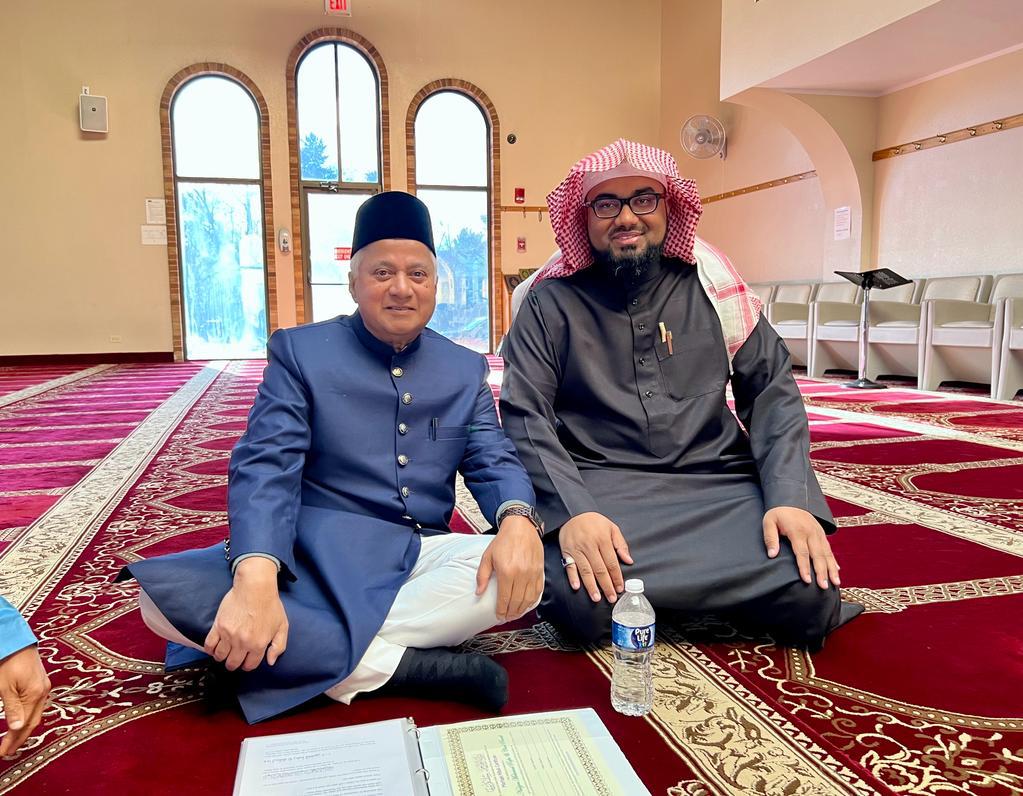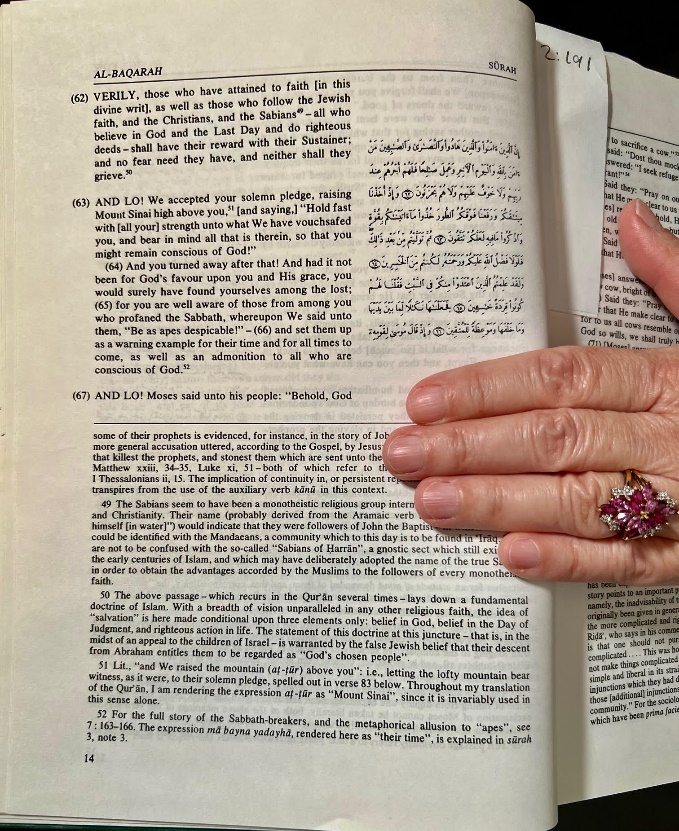
Dr. Mike Mohamed Ghouse
Anyone who subscribes to the following three fundamental values is known as a Subscriber or a Muslim; the traditional word is submission. These ideals result in living in peace and harmony with oneself, fellow humans, and the universe. The purpose was to create cohesive societies where every human feels secure about his identity.
1) At the heart of Islam is the belief in a cause of the universe, referred to by many names, including Allah and God. This cause, known as ‘Allah, is the focus of our devotion and understanding.
2) A central belief in Islam is that each individual bears responsibility for their actions. This means that we cannot evade the consequences of our deeds. This principle of personal accountability is a guiding light in our faith, urging us to live a life of righteousness and integrity.
3) Each of us cares about what surrounds us: the universe – humans, animals, and the environment.
The above is my understanding of verse 62 from Sura Baqarah, chapter 2 of the Quran, supported by one of the most outstanding contemporary Muslim scholars, Muhammad Asad. Asad’s translation is the most accepted in the world, as is his tafseers – exegesis.
Among those who call themselves Muslims, we have four main branches Shia, Sunni, Sufi and Ahmedi, and within each group, there are countless denominations such as Bohra, Ismaili, Ahle Hadees, Ahle Sunnat, Wahhabi, Lahori, Naqshbandi to name a few. We don’t make any distinction, and there is absolutely no compulsion in faith. All are valid in their own regards and they are all Muslims to us.
The creator of the universe loves its creation, like a mother loves her offspring. Because he loves his creation, he guides humanity through the holy books, so that they can live in peace and harmony with fellow humans, animals, and the environment.
Per the teachings of the Prophet Muhammad (pbuh) – A Muslim is an exemplary citizen, the Al-Amin, who cares for fellow humans, tells the truth, stands up for justice for fellow humans, and cares for the environment. He is not arrogant and forgives those who trespass against him. He seeks forgiveness for his trespasses. It is how cohesive societies are curated where we feel secure regardless of our faith or no faith, race, ethnicity, or other uniqueness. God wants each of us to be secure.
It is a shame that some societies reduce Muslims to their clothing, hijab, and beard rather than their character. As we come out of our shells, we realize that not all Muslims are alike; they dress, eat, and speak differently.
Everything we do is laden with rituals. When we get up in the morning, we all follow certain rituals. Likewise, we follow certain rituals when we sit in for dinner, in the car, or go to the office. Islam also has rituals that give meaning to our belief, and they are Shahadah-the pledge, Salat (Namaz)-the prayer, Soum (Roza)-fasting, Zakat-Charity, and the optional Hajj pilgrimage. Each of these rituals is for our benefit and to make us wholesome humans. This is Islam.
Each society develops its systems to keep its flock together, which are cultural in nature and have become religious over time. We must always understand the difference between culture and religion and remove misogyny, homophobia, Islamophobia, Hinduphobia, Anti-Semitism, Xenophobia, bigotry, and other ills of society from each one of our religions.
In 632 AD, Prophet Muhammad declared that all men are equal, no white is superior to black or vice versa, and men are not superior to women and vice versa.
1144 years later, in 1776 AD, Thomas Jefferson, our founding father sounded similar when he wrote our declaration of Independence in 1776, “We hold these truths to be self-evident, that all men are created equal, that they are endowed by their Creator with certain unalienable Rights, that among these are Life, Liberty and the pursuit of Happiness.” Indeed, that is the reflection on Islam’s ideals.
At the World Muslim Congress, we make an effort to carry forward the tradition of the Prophet, who liberated societies from some of the inhumane practices to come to terms with Universal Human Rights. For example, the Prophet said that for the first time in human history, that a woman can own property in her name, run a business, and choose whom she wants to marry or divorce.
Imagine God as the CEO of the universe. What does the CEO of a corporation want? He wants his employees to get along, maintain social cohesion, increase productivity, prevent losses, and preserve the corporation’s assets. God is no different; he created the universe in balance and wants us, the intelligent beings (Khalifa-Manager), to keep the harmony intact for our benefit.
Nearly 50 verses in the Quran call on each human (that’s right, the Quran addresses humanity from the beginning to the end) to think and reflect. God does not want blind believers. He wants confident subscribers to his guidance. “If it is not common sense, then it is not Islam – www.WorldMuslimCongress.org”
The guidance in the Quran is to create cohesive societies where each of us from different communities (49:13) feels secure regardless of our faiths, race, ethnicity, or other uniqueness. Had God wanted (5:48), he would have created all of us to be exactly alike with the same height, weight, color of hair, and skin. It could have programmed all of us to be uniform, precise machines, but it created each of us to be unique with our thumbprint, eyeprint, DNA, and taste buds. The highest tribute (worship) one can pay to the creator is respecting and accepting the God-given uniqueness of each one of us.
Islam is about creating cohesive societies where every human feels secure and at peace; peaceful societies are indeed Islam’s end goal. The mission of Prophet Muhammad was to design and develop such societies; his role was to be a peacemaker (Rahmatul Aalameen Quran 21.107), a conflict mitigator, and a goodwill nurturer.
Indeed, whenever a society went afoul, someone among us was born to restore righteousness. They were all peacemakers; some were called Prophets, Messengers, or Avatars. To name a few, they are Abraham, Jesus, Moses, Krishna, Ram, Buddha, Nanak, Mahavir, Bahaullah, Confucius, and many others.
Per the Quran and the Prophet, Islam is not a new religion. The monotheistic tradition (there is always one ultimate boss where you work) began with Prophet Abraham, Moses refined it, Jesus capped it off, and Mohammad (pbuh) gave the final touch to the same message from all the great men on the earth.
Please reflect on the universality of the following verses about Interfaith Marriages.
- God is the causer of the universe, i.e., the God of 8 billion people (Q 1:2). We are its creation.
- God created the universe in balance and harmony and expects us to preserve that balance (55:8-11).
- Nowhere in the Quran does God tell us not to marry another human being; all that God says is to marry someone compatible and responsible.
- In 30:21, God says it places love between two souls (from among 8 billion of its creation) so they can live in harmony and tranquility.
- Freedom is the foundation upon which the Quran’s guidance rests. There is no compulsion in one’s faith 2:256
- The Prophet guided the subscribers to become exemplary citizens – The Amins.
- No one will bear others’ burdens on the day of Judgment – parents, spouse, siblings, children, and even the Prophet are not responsible for what an individual does (35:18) but himself.
- It is only the creator who judges our morality (1:3)
- All that the creator wants is for us to live in harmony.
The wisdom in every verse of the Quran is for the good of human beings. When God says it is like those who forgive often, it is for our benefit; when we forgive, we find freedom from apprehension and tension, and our blood does not boil when we hear or see someone who has harmed us.
Indeed, “If it is not common sense, then it is not Islam.” WorldMuslimCongress.org.
VERSE 2:62
Mohammad Asad’s translation and interpretation are some of the most recognized works worldwide, and they represent the values to which we subscribe; He is the Rabbul Aalameen, the creator, sustainer and recycler of the universe (ٱلۡحَمۡدُ لِلَّهِ رَبِّ ٱلۡعَـٰلَمِینَ ) and Muhammad is mercy to humanity (وَمَاۤ أَرۡسَلۡنَـٰكَ إِلَّا رَحۡمَةࣰ لِّلۡعَـٰلَمِینَ ). As followers of them, we must be the Mukhlooqul Aalameen (مخلوق لِّلۡعَـٰلَمِینَ), i.e., a being for the good of all humanity.
إِنَّ ٱلَّذِینَ ءَامَنُوا۟ وَٱلَّذِینَ هَادُوا۟ وَٱلنَّصَـٰرَىٰ وَٱلصَّـٰبِءِینَ مَنۡ ءَامَنَ بِٱللَّهِ وَٱلۡیَوۡمِ ٱلۡءَاخِرِ وَعَمِلَ صَـٰلِحࣰا فَلَهُمۡ أَجۡرُهُمۡ عِندَ رَبِّهِمۡ وَلَا خَوۡفٌ عَلَیۡهِمۡ وَلَا هُمۡ یَحۡزَنُونَ
inna alladhīna āmanū wa-alladhīna hādū wal-naṣārā wal-ṣābiīna man āmana bil-lahi wal-yawmi l-ākhiri waʿamila ṣāliḥan falahum ajruhum ʿinda rabbihim walā khawfun ʿalayhim walā hum yaḥzanū
A few different translations are presented, including a bad one.
Mohammad Asad – 2:262 “VERILY, those who have attained to faith, as well as those who follow the Jewish faith, and the Christians and the Sabians– all who believe in God and the Last Day and do righteous deeds – shall have their reward with their Sustainer; and no fear need they have, and neither shall they grieve.”
M Pickthall, 2:62, “Lo! Those who believe (in that which is revealed unto thee, Muhammad), and those who are Jews, Christians, and Sabaeans – whoever believeth in Allah and the Last Day and doeth right – indeed, their reward is with their Lord, and there shall no fear come upon them, neither shall they grieve.”
George Sale, 2:62, “Surely those who believe, and those who Judaize, and Christians, and Sabians, whoever believeth in God, and the last day, and doth that which is right, they shall have their reward with their Lord, there shall come no fear on them, neither shall they be grieved.” ‘
George Sale was one of the first translators of the Quran (1697-1736), and Thomas Jefferson donated this copy of the Quran to the Congressional Library. Former Congressman Keith Ellison was the first person in public office to take the oath on it.
Safi Kaskas, 2:62 Indeed, the believers, Jews, Christians, and Sabians—whoever truly believes in Allah and the Last Day and does good will have their reward with their Lord. And there will be no fear for them, nor will they grieve.
Dr. Laleh Bakhtiar, 2:62 “Truly, those who believed, and those who became Jews, and the Christians and the Sabeans, whoever believed in God and the Last Day and did as one in accord with morality, then, for them, their compensation is with their Lord. And there will be neither fear in them nor will they feel remorse.
Dr. Laleh Bakhtiar is the first woman translator of the Quran who corrected the misogynistic translations of the Quran; she also endorsed my book, the American Muslim Agenda, available at Amazon.
Mustafa Khattab, 2:62: “Indeed, the believers, Jews, Christians, and Sabians—whoever truly believes in Allah and the Last Day and does good will have their reward with their Lord. And there will be no fear for them, nor will they grieve.”
Please beware of the bad translations by Bijan Moeinian and Hilali Khan.
Mohammad Asad writes: “The above passage (2:62), which recurs in the Quran several times – lays down a fundamental doctrine of Islam. With a breadth of vision unparalleled in any other religious faith*, the idea of ‘salvation’ is here conditional upon three elements: belief in God, belief in the Day of Judgement, and righteous action in life.”
*I would not compare faiths; they are faiths, not objects or facts to be compared.
Let me unpack the three items in the above paragraph.
1. Belief in God – what is the need?
If you present a gift to your friend, and they do not thank you, there will be a momentary awkwardness, even though you were not expecting a thank you. A thank you completes the transaction, and you are back in your comfort zone and out of bother.
My understanding (not a translation) is based on God’s wisdom for all his creation (Aalameen) to live in peace and harmony.
We did not storm out of our mother’s womb just like that; many perfected systems were created for us to be delivered from a zygote to a baby to a full-grown human.
We appreciate our parents, siblings, family, friends, spouse, children, food, and everything God has spread out for us (Quran 55:10) – He spread things on earth for all living beings). Thanking that causer for all we have completes a life transaction and restores balance, and we restore the gift of life with gratitude.
It is one of the reasons to believe in the causer of the universe.
2. Belief in the Day of Judgment
We are accountable for our actions. No one goes scot-free. Justice (balance) is the core value for all acts of creation.
All things must balance out or zero out to survive. If a planet is not balanced and off by half a degree, it is liable to collapse. If a tree does not have the required elements to grow and live, it will eventually die. Indeed, the survival of the fittest applies to every form of life, including humans.
Everything is programmed to function; however, human happiness is not programmed; we are created (or given) with freedom (or choice) to determine how we live.
Islam calls it a Day of Judgment, and it is indeed a moment of reckoning. Some recognize their agony and its cause and find freedom, also known as Moksha in Hinduism and salvation in general language. People can also view it as being accountable for their conscience and living in harmony with themselves.
The belief in accountability, or the law of Karma, helps enrich one’s life by setting a regret-free and tension-free course.
3. Caring for Others.
What is virtuous action? It is honoring others’ rights and learning to respect each one of us God-given uniqueness. Salvation in Islam comes from taking care of God’s creation. Why should we care about others? If others around me are peaceful, I can live comfortably, so it behooves me to create such an environment.
If we don’t stand up for others, why should anyone stand up for us?
Whoever is accountable for their good actions earns peace or lives in disharmony for wrong actions. Finally, whoever cares for everything that surrounds us, humans, animals, and the environment in our universe, need not worry; their reward is with God. That reward is living a peaceful, guilt-free life with the most minor apprehensions and tensions. In Hinduism, Jainism, and Buddhism this is called Moksha, Mukti, and Nirvana respectively.
If you subscribe to the above three ideals, you are called a Muslim. As societies developed, we added many things to these values per the needs of the time, as it happens in everything we do. It is a culture born out of the needs of time and becomes a part of religion. If we can separate culture from religion, we will see all religions have the same purpose – i.e., to create cohesive societies where every human feels safe, therefore at peace.
In an effort to digest the meaning of the above verse, it essentially says you don’t have to wear a Muslim group label to earn God’s grace. Islam is indeed a way of life (deen). It simply means living in peace and tranquility with what surrounds you: life and environment. Islam and the Quran are guides to living in harmony with the Aalameen (universe).
# # #
Who am I? https://interfaithmarriages.org/muslim-background-of-dr-mike-mohamed-ghouse/
Dr. Mike Mohamed Ghouse is a social scientist, pluralist, and an Interfaith Wedding Officiant. As of 12/31/23, he has officiated over 350 weddings between Muslims, Hindus, Christians, Jews, Humanists, Jains, Sikhs, and Buddhists; within Islam, he has officiated Nikah ceremonies between Sunni, Shia, Bohra, Ahmedi, and other denominations, including Zoom Nikahs. Mike will travel within the United States, Canada, Mexico, and other places when his schedule permits. Through consultations with the couple, he skillfully customizes the proceedings to include their faith and cultural traditions. You can text him with your name(s) and email(s) to (214) 325-1916 to discuss your ceremony. Please visit our site for many articles that may address your questions. www.InterfaithMarriages.org
Mike would be happy to share his extensive work on Pluralism and Islam, including the book “American Muslim Agenda” and its offshoot “20 Common Sense Islamic Values,” which is a writing to teach Islam in schools. More about him at
20 COMMON SENSE ISLAMIC VALUES
If it is not common sense, then it is not Islam
https://worldmuslimcongress.org/20-common-sense-islamic-values/
Images below for verse 2:62 and the exegesis from the Quran



